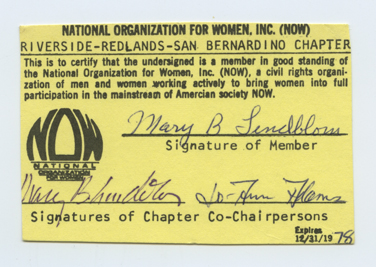Background on Mary B. Stinson

NOW membership card
Mary B. Stinson (formerly Lindblom) was an activist involved with the National Organization for Women (NOW) in California. She served as a delegate from California at the First National Women's Conference in Houston and attended the 1979 NOW conference in California.
The National Women's Conference (NWC) was a result of a series of actions in observance of International Women's Year (IWY) in 1975. On January 9th, 1975, President Ford issued Executive Order No. 11832, establishing the National Commission on the Observance of International Women's Year with the objectives of recognizing the contributions of women and promoting equality of the sexes. The Commission was responsible for orchestrating events in celebration of IWY, as well as investigating discrimination and other issues affecting women and submitting recommendations for action to the President and Congress. Originally intended to dissolve at the end of 1975, the Commission was extended for a second year by President Ford.
In 1975, a bill proposing the National Women's Conference was passed by Congress. When it was finally held in 1977, it was the first federally commissioned and funded event of its kind. The conference was an opportunity for leaders, delegates and guests to come together from all over the country, from different socio-economic, racial and ethnic backgrounds, of all ages and political views alike. The three day event was a venue for speeches from speakers such as Gloria Scott, Bella Abzug, Rosalynn Carter, Betty Ford, Liz Carpenter and Barbara Jordan, as well as lectures and workshops on topics such as business, law, and history.
In addition to being a platform for bringing the nation's women together, one of the main goals of the conference was the creation and ratification of a National Plan of Action. The National Plan of Action was a set of recommendations for combatting inequality, handed off to the President and Congress. It consisted of 26 planks, core areas or issues affecting women in the United States which were agreed upon by delegates of the convention: arts and humanities, battered women, business, child abuse, child care, credit, disabled women, education, elective and appointive office, employment, Equal Rights Amendment, health, homemakers, insurance, international affairs, media, minority women, offenders, older women, rape, reproductive freedom, rural women, sexual preference, statistics, welfare and poverty and the committee of the conference. Each of these topics was researched and outlined in the official report.
A central issue to the NWC and the women's movement during the 1970s was the passage of the Equal Rights Amendment. The ERA was proposed to constitutionally guarantee equality of the sexes under U.S. law, protecting against discrimination and insuring equal opportunities and benefits. Opponents of the amendment believed it would be used to legalize gay marriage and abortion, remove legal protections for women from law, subject women to military draft, force religious bodies to disobey the laws of their religions, and prohibit unisex bathrooms, clubs or sports teams. The ERA was passed by both the House and the Senate with votes of 354 to 23 and 84 to 8, respectively, however it was only ratified by 35 of the necessary 38 states for it to be passed into law.
Besides being a conference delegate, Stinson also served as coordinator for her local National Organization for Women chapter. NOW was founded in 1966 in response to the growing women's rights movement and is still active to this day.

